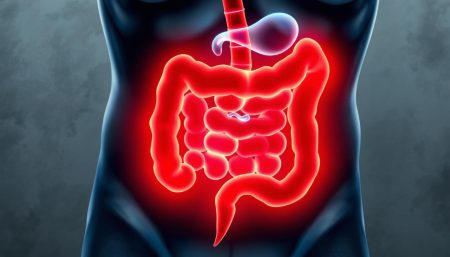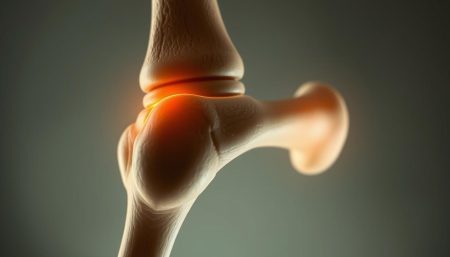It’s crucial to know the early warning signs of colon cancer. This disease quietly affects millions but can be managed better if caught early. Learning about the importance of recognizing colon cancer symptoms is key. Early detection opens up more treatment options and improves survival chances.
This article aims to educate readers about these important health signs. It’s a vital resource for staying informed about these critical health signals.
Understanding Colon Cancer and Its Importance
Key Takeaways
- Being aware of the early warning signs can save lives.
- Early detection of colon cancer leads to more successful treatment outcomes.
- Knowledge empowers individuals to seek timely medical advice.
- Recognizing changes in the body is critical for early diagnosis.
- Regular screening can detect colon cancer early, even before symptoms appear.
Understanding Colon Cancer and Its Importance
When you ask “what is colon cancer?”, it’s important to understand its medical definition and its impact on public health. Colon cancer starts in the large intestine and can be deadly if not treated. But, with more colon cancer awareness and early detection, managing the disease becomes much easier.
Colon cancer comes from benign polyps in the colon that can turn cancerous over time. Spotting these changes early is why colon cancer awareness is so crucial. Learning about it can lead to early medical action, which is key. A study shows the benefits of preventive screenings on HealthWith.com.
The significance of early detection is huge. Catching colon cancer early can lead to treatments that are less harsh and more effective. This can save lives. So, campaigns and education are key to raising awareness and response to this disease.
| Stage at Detection | 5-Year Survival Rate | Treatment Complexity |
|---|---|---|
| Early (Stage I) | 90%-95% | Often less invasive |
| Late (Stage III & IV) | 20%-35% | More complex, intense treatments |
So, raising colon cancer awareness and the significance of early detection are crucial. Encouraging regular screenings and knowing the signs can improve outcomes worldwide.
Recognizing the Common Symptoms of Colon Cancer
Colon cancer is a major cause of cancer deaths. It can be treated well if caught early. Knowing the early signs like bowel habit changes, rectal bleeding signs, and ongoing abdominal pain causes is key to acting fast.
Changes in Bowel Habits
One key common symptom of colon cancer is changes in how often you go to the bathroom. You might find yourself going more often, less often, or your stool might look different. These bowel habit changes can mean there’s something wrong with your colon.
Rectal Bleeding or Blood in Stool
Rectal bleeding signs are very worrying signs of colon cancer. The blood in your stool can look bright red or dark. It’s very important to see a doctor right away to figure out what’s going on.
Persistent Abdominal Discomfort and Pain
Another important symptom is ongoing discomfort in your belly. This can feel like bloating, gas, or abdominal pain causes that don’t go away. These symptoms might seem like normal digestion issues. But if they keep happening, they could mean something serious is wrong.
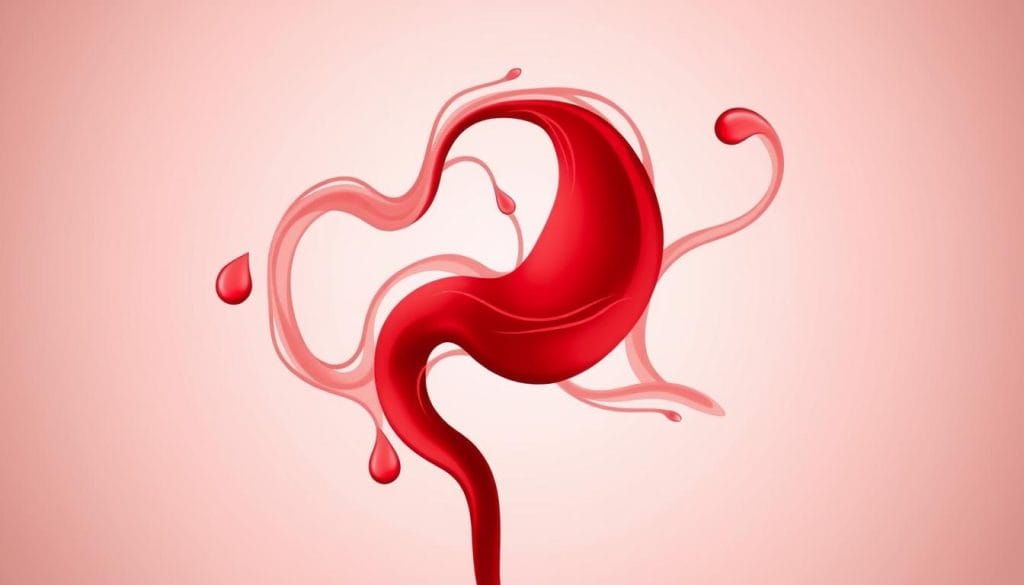
These symptoms can be vague and not clearly point to colon cancer. This makes it even more important to stay aware and get regular health checks.
Colon Cancer Symptoms: Why Early Detection is Crucial
Finding colon cancer early is key to better treatment and survival chances. Early detection means starting treatments sooner. It also leads to better colon cancer treatment success. Knowing the benefits of early diagnosis is vital for patients and doctors.
Why is early detection transformative? It often catches cancer when it’s easier to treat. Here are some facts:
- Increases the number of available treatment options
- Reduces the complexity and duration of treatment
- Enhances quality of life post-treatment
- Improves overall survival rates
| Stage at Diagnosis | Treatment Success Rate | 5-Year Survival Rate |
|---|---|---|
| Early (Stage I) | High | 90-95% |
| Advanced (Stage III-IV) | Variable | 20-60% |
Spreading the word about screenings can help find colon cancer early. Knowing the signs can lead to quick doctor visits. This means early diagnosis.
Working together to teach about early diagnosis benefits can help fight colon cancer. Quick action can change a tough prognosis to a story of survival and colon cancer treatment success.
The Significance of Unexplained Weight Loss
Experiencing a sudden and alarming weight drop can be very worrying. It might come from many reasons, but if it’s unexpected and big, it’s important to pay attention. This could mean you have a serious health issue like colon cancer.
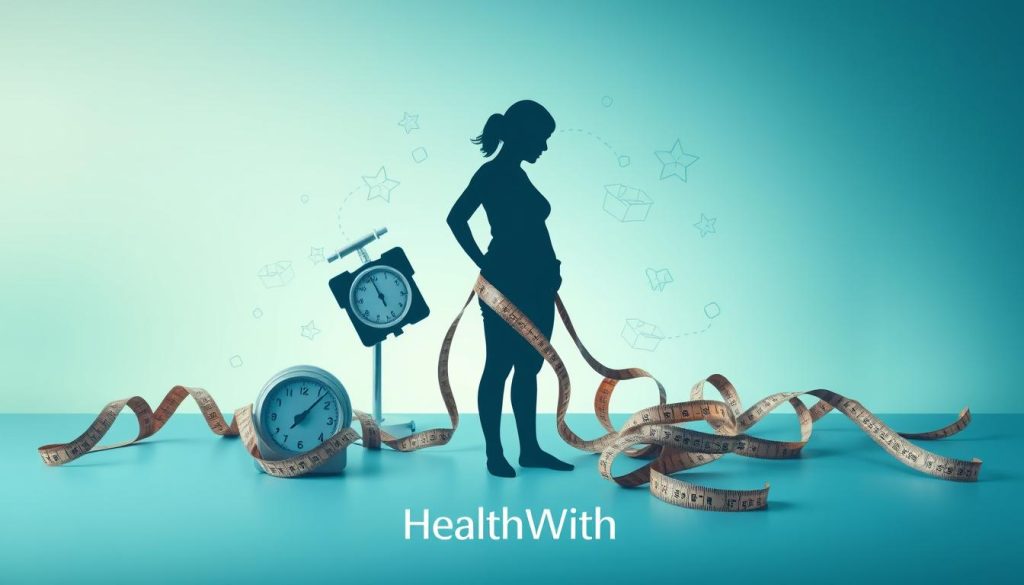
When to Be Concerned
Not every weight change is a cause for worry. But, unexplained weight loss of more than 5% of your body weight in 6 to 12 months is a red flag. It’s especially important to watch for this if you’re at risk for colon cancer or if you notice other symptoms.
How Weight Loss Relates to Colon Cancer
Weight loss colon cancer symptom happens because the cancer uses up the body’s energy. Tumors can also mess with how the body uses food, making it hard to absorb nutrients. If colon cancer is not caught early, the weight loss will get worse, making it crucial to find it early.
| Weight Loss Context | Associated Risk Level | Urgency of Medical Evaluation |
|---|---|---|
| 5-10% loss in 6-12 months | Moderate | See a doctor soon |
| Over 10% loss in less than 6 months | High | See a doctor immediately |
| With additional symptoms like blood in stool or a change in bowel habits | High | See a doctor immediately |
Experiencing Persistent Fatigue: A Symptom Not to Ignore
When fatigue doesn’t go away, it’s a sign that something serious might be happening. In cases of colon cancer, persistent fatigue and chronic tiredness are symptoms that need attention. It’s important to take these signs seriously, especially if they come with other concerning symptoms.
Persistent fatigue could be an early warning sign of colon cancer. This fatigue doesn’t get better with rest and often goes with other symptoms like unexplained weight loss or changes in bowel habits. Knowing the possible reasons for chronic tiredness can help people get medical help early, which might lead to catching colon cancer early.
- Persistent weariness despite adequate rest
- Reduced ability to perform daily tasks
- Lack of concentration and chronic tiredness
Several things can cause fatigue related to colon cancer. These include not having enough oxygen due to anemia, fighting off cancer cells, or the energy needed to grow tumors.
| Symptoms | Related Conditions | Urgency for Medical Check |
|---|---|---|
| Persistent fatigue | Colon Cancer | High |
| Anemia | Various including Colon Cancer | Medium to High |
| Unexplained Weight Loss | Colon and other Cancers | High |
| Chronic Tiredness | Often overlooked, possible early cancer sign | High |
If you’re feeling persistent fatigue and other symptoms like rectal bleeding, see a doctor. Ignoring these signs could delay finding out about serious conditions like colon cancer. Talking to your doctor about fatigue related to colon cancer early is crucial. Don’t wait until fatigue is overwhelming; catching it early can save your life.
Bowel Habit Changes That May Indicate Colon Cancer
Changes in how often you go to the bathroom can signal health issues. This includes constipation or diarrhea. Knowing about these changes is key to spotting problems early, like constipation and colon cancer.
From Constipation to Diarrhea
Some changes in bowel habits are a red flag. If you’re constipated and it gets worse, it might mean colon cancer. A tumor in the colon can block your bowel.
On the other hand, diarrhea could also be a sign. Cancer can irritate the intestine or cause blockages. Paying attention to these changes is important for spotting colon cancer early.
Understanding What Your Body is Saying
It’s crucial to listen to your body and watch for patterns in bowel habits. Catching these changes early can greatly improve treatment outcomes for colon cancer.
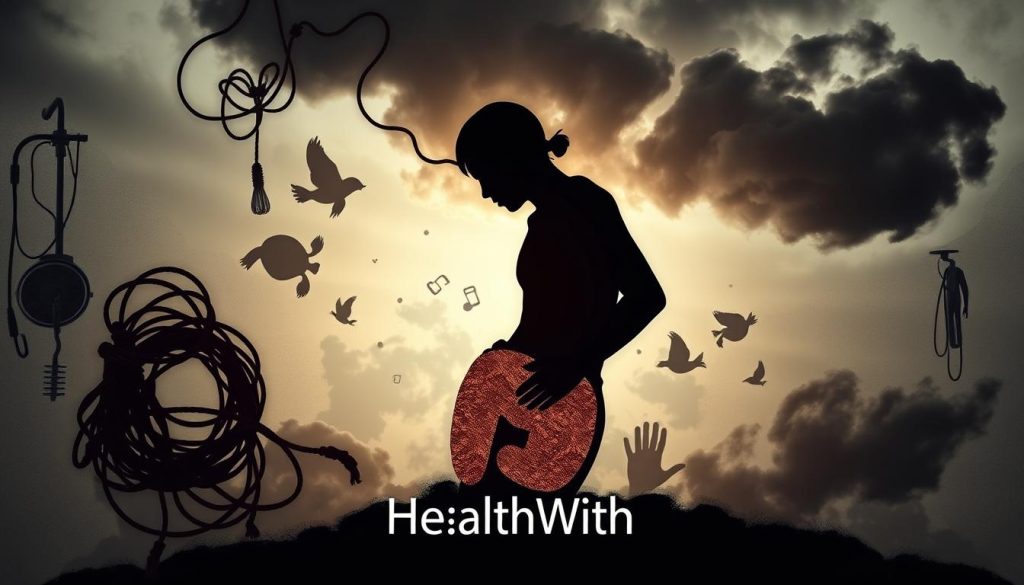
How Iron Deficiency Anemia Can Signal Colon Cancer
Iron deficiency anemia is more than just a sign of not getting enough iron. It can also point to serious health problems, like anemia signs of colon cancer. It’s key to know how low iron levels and colon cancer are linked for early treatment.
Colon cancer can cause iron deficiency anemia by leading to blood loss. This loss is often not noticed by the person. It slowly takes away the body’s iron, causing anemia. The early anemia signs of colon cancer can lead to more tests.
- Persistent fatigue and weakness
- Paler than normal skin
- Shortness of breath
- Frequent headaches
These symptoms aren’t just about iron deficiency anemia. They can mean many things. So, it’s important to see a doctor to figure out what’s going on.
If iron deficiency anemia is found, looking into anemia signs of colon cancer is key. This is especially true for people at risk or with other symptoms like weight loss or changes in bowel habits. A colonoscopy might be needed to check for colon cancer. Treating iron deficiency anemia means finding and fixing the cause, not just adding iron.
“Awareness is the greatest agent for change.” – Knowing the signs and symptoms of health problems can lead to early action. This can greatly improve treatment outcomes.”
Dealing with iron deficiency anemia in a full way can catch colon cancer early. Watching for anemia signs of colon cancer and keeping iron levels right are key to preventing cancer and keeping healthy.
Exploring the Link Between Abdominal Pain and Colon Cancer
Abdominal pain can have many causes, from simple to serious. But how do you know if it’s related to colon cancer? We’ll look at signs of pain that might be linked to colon cancer. We’ll also stress the importance of seeing a doctor quickly.
Differentiating Between Common and Concerning Pains
Many people have some kind of abdominal pain. But not all pain is the same. Knowing when to worry about abdominal pain linked to colon cancer is key. Mild, regular pain is usually from digestion. But sharp, ongoing pain might mean something serious like colon cancer.
Seeking Medical Advice for Abdominal Pain
If you have ongoing or severe pain, see a doctor right away. Doctors can do tests like colonoscopies to check for colon cancer or other problems.
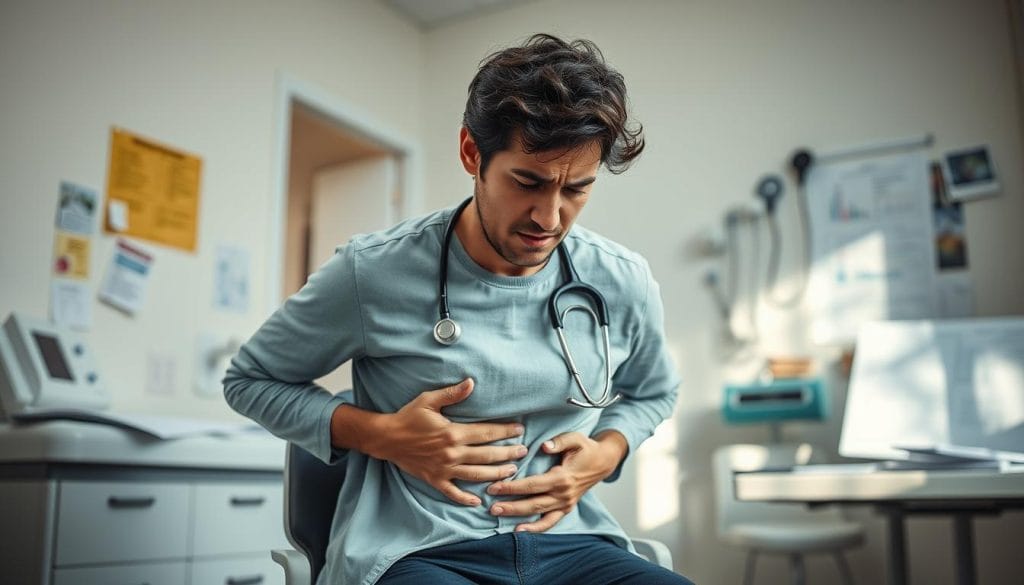
Understanding abdominal pain and colon cancer can be scary. But knowing the signs and getting medical help can help a lot. Here’s a look at typical vs. serious pain:
| Type of Pain | Description | When to Consult Doctor |
|---|---|---|
| Mild and Infrequent | Often related to benign conditions like gas or indigestion | If persists more than a few days |
| Persistent and Severe | Cramping, sharp pain, potentially indicative of serious conditions | Immediately |
| Associated with Other Symptoms | Including weight loss, changes in bowel habits, or blood in stool | Immediately |
Pain that keeps coming back, gets worse, or comes with other symptoms like bleeding, weight loss, or bowel changes needs quick doctor visits. These signs can mean colon cancer.
Rectal Bleeding as a Red Flag for Colon Cancer
Spotting colon cancer early is crucial, and rectal bleeding is a clear warning sign. It’s not just a rectal bleeding concern. It could be a serious red flag symptom for colon cancer. Acting fast can lead to early diagnosis and better treatment.
Rectal bleeding can look different, from small spots on toilet paper to a lot of blood in the toilet. But, not all bleeding is from colon cancer. Still, it’s important to see a doctor right away for a check-up.
| Appearance of Rectal Bleeding | Possible Causes | Immediate Actions |
|---|---|---|
| Bright red bleeding | Colon cancer, hemorrhoids, anal fissure | Consult healthcare provider |
| Dark red or maroon blood | Colon cancer, diverticulosis, inflammatory bowel disease | Seek urgent medical attention |
| Mixed with stool | Colon cancer, gastrointestinal bleeding | Schedule colonoscopy |
Identifying rectal bleeding is just the start. Knowing its causes and spotting colon cancer early can make a big difference. This symptom is a clear red flag and needs immediate action. Regular checks and quick doctor visits can catch cancer early, improving treatment chances.
- Notice unexpected rectal bleeding? Schedule a healthcare provider visit without delay.
- Early detection from symptoms like this can be life-saving.
- Follow through with prescribed screenings especially if you have a family history or are in a higher risk group.
In conclusion, rectal bleeding concern is serious but can be a clue to spotting colon cancer early. It’s vital to act quickly. Being aware and proactive can help fight this dangerous disease.
Physical Signs: Examining Your Body for Indicators of Colon Cancer
It’s important to watch for physical signs of colon cancer early. This can lead to better treatment. We’ll look at both noticeable body changes and subtle health indicators that might mean colon cancer.
Visible Changes to Consider
One clear sign of colon cancer is swelling or bloating in the belly. These symptoms might not hurt but should get you to see a doctor right away.
Subtle Signs That Shouldn’t Be Overlooked
Small signs of colon cancer include feeling very tired and changes in how you go to the bathroom. These signs might not seem serious at first. But, they’re important and need attention.
Regular health checks are key to catching problems early. Learning about prevention, as in this article, helps you stay healthy.
| Noticeable Change | What it Might Indicate |
|---|---|
| Bowel habit changes (constipation or diarrhea) | Potential blockages or other abnormalities in the colon |
| Unexplained weight loss | Possible loss of appetite or a sign of a more serious condition |
| Persistent abdominal bloating | Could be a mass or an accumulation of fluid |
Bowel Obstruction: A Serious Symptom of Colon Cancer
Colon cancer can be complex, and one serious symptom is bowel obstruction. This condition is a key sign of advanced colon cancer. Knowing the symptoms, causes, and urgent treatments is crucial for managing and treating the disease effectively.
Bowel obstruction, or intestinal blockage, shows through severe symptoms. These symptoms include intense abdominal pain, vomiting, and trouble passing gas or stools. It’s a serious condition that needs quick medical help to avoid severe complications or death.
Here’s a look at the main differences and emergency actions for intestinal blockage:
| Characteristic | Impact | Immediate Action Required |
|---|---|---|
| Severe abdominal pain | Indicates potential blockage or perforation within the intestine | Seek emergency medical evaluation |
| Vomiting | Can lead to dehydration and electrolyte imbalance | Medical intervention to replenish fluids and stabilize the patient |
| Inability to pass gas or stool | Sign of complete intestinal blockage | May require surgical intervention to remove blockage |
Managing intestinal blockage might involve surgery to remove the blockage. Sometimes, stents are used to help the intestines work again. Early treatment and detection are key to a good recovery.
If you or a loved one shows signs of a bowel obstruction, get medical help right away. Quick action can ease pain and reduce the risk of serious complications.
Assessing Risk Factors and When to Get Screened
It’s important to know what increases your risk of colon cancer to decide when to get screened. This section talks about genetic predispositions and lifestyle factors that raise your risk. It also covers the latest colon cancer screening guidelines.
Genetic Predispositions and Lifestyle Factors
There are two main types of risk factors for colon cancer: genetic and lifestyle. If you have a family history of colon cancer or certain genetic conditions, you’re at higher risk. Eating a lot of red and processed meats, not being active, being overweight, smoking, and drinking too much alcohol also increase your risk.
Recommended Ages and Methods for Screening
Following the colon cancer screening guidelines is key for catching cancer early. The table below shows the best screening methods and when to start for those at average risk, based on health expert advice.
| Age Group | Recommended Screening Method |
|---|---|
| 45-75 years | Colonoscopy every 10 years or FIT annually* |
| 76-85 years | Screening decisions should be based on overall health and prior screening history |
| Over 85 years | Generally not recommended |
*FIT stands for Fecal Immunochemical Test, a yearly test for hidden blood in the stool. It can be an early sign of colon cancer.
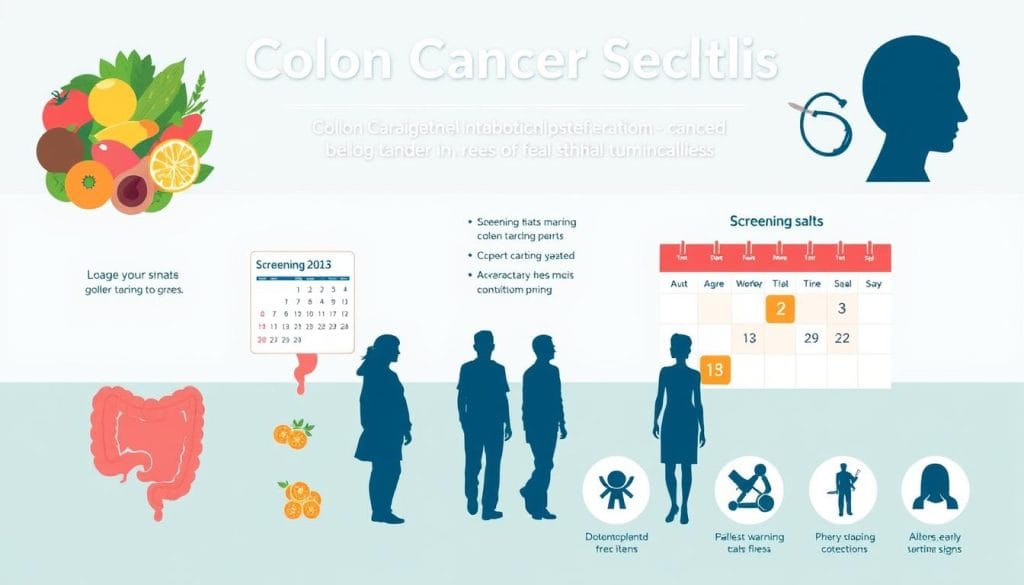
Conclusion
When it comes to colon cancer, knowing the signs is key. Spotting symptoms early can help prevent the disease. We’ve talked about signs like changes in bowel habits and unexplained weight loss.
These signs are important for catching colon cancer early. Early detection makes treatment much easier.
Preventing colon cancer also means taking care of yourself. Eating right, exercising, and knowing your health history are all important. Regular screenings are crucial, especially for those at higher risk.
Screenings help find colon cancer early, which can save lives. They are a big part of staying healthy.
Remember, knowing about your health is powerful. By taking care of yourself and getting help when needed, you can fight colon cancer. This article is a reminder that your health is in your hands. Taking action now can lead to a healthier future.
FAQ
What are the early warning signs of colon cancer?
Look out for changes in bowel habits like constipation or diarrhea. Also, watch for rectal bleeding or blood in your stool. Persistent abdominal discomfort or pain, unexplained weight loss, and fatigue are other signs. Catching these early can help a lot.
Why is it important to recognize colon cancer symptoms?
Spotting symptoms early can greatly improve treatment chances. Early detection means more treatment options. This can lead to better survival rates and a better life after treatment.
What should I know about colon cancer and its development?
Colon cancer starts in the large intestine or rectum. It often begins with benign polyps that can turn cancerous. Risk factors include age, family history, diet, obesity, smoking, and alcohol use. Catching it early is key to stopping it from spreading.
When should unexplained weight loss be concerning?
Unexplained weight loss is a red flag, especially if it’s significant. It might mean your body isn’t absorbing nutrients well due to cancer. If you’re losing weight without diet or exercise changes, see a doctor.
Can fatigue be related to colon cancer?
Yes, fatigue can be a sign of colon cancer. It could be due to poor nutrition, anemia from blood loss, or other reasons. If fatigue doesn’t get better with rest and you have other symptoms, see a doctor.
What types of bowel habit changes may indicate colon cancer?
Changes like persistent constipation or diarrhea, changes in stool consistency, or feeling like your bowel doesn’t empty fully might indicate colon cancer. If you notice any significant or persistent changes, talk to a healthcare professional.
How can iron deficiency anemia signal colon cancer?
Iron deficiency anemia can be a sign of colon cancer if it’s due to chronic blood loss. Cancer can cause slow bleeding that’s not seen in the stool. This can lead to a drop in iron levels and anemia, signaling a need for medical evaluation.
How can I differentiate between common abdominal pain and pain related to colon cancer?
Common abdominal pain is usually short-lived and not specific. Pain from colon cancer is persistent and severe. It often comes with other symptoms like changes in bowel habits or weight loss. If you have persistent or severe pain, get it checked by a doctor.
What does rectal bleeding indicate, and should it be taken seriously?
Rectal bleeding can be a sign of serious conditions like colon cancer, especially with other symptoms. While it can also be from less serious issues like hemorrhoids, it’s crucial to have it checked by a healthcare provider to rule out cancer or other severe conditions.
What are some visible and subtle physical signs of colon cancer?
Visible signs include changes in stool color or shape, noticeable weight loss, and jaundice. Subtle signs include feeling like your bowel doesn’t empty fully, unexplained fatigue, and iron deficiency anemia. Any new or unusual signs should prompt a visit to the doctor.
What is bowel obstruction, and why is it a serious symptom of colon cancer?
Bowel obstruction is a blockage that prevents food and liquids from passing through the intestine. It’s a serious symptom of advanced colon cancer. Symptoms include severe abdominal pain, vomiting, and inability to pass stool or gas. This requires immediate medical attention.
What are the risk factors for colon cancer, and when should I get screened?
Risk factors include age (50 years and older), family history, certain genetic disorders, diet, smoking, and heavy alcohol use. Screening is recommended starting at age 45 or earlier if there’s a family history or other risk factors. Talk to your doctor about the best screening methods for you.













